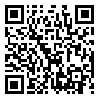Volume 21, Issue 7 (2019)
JAST 2019, 21(7): 1721-1736 |
Back to browse issues page
Download citation:
BibTeX | RIS | EndNote | Medlars | ProCite | Reference Manager | RefWorks
Send citation to:



BibTeX | RIS | EndNote | Medlars | ProCite | Reference Manager | RefWorks
Send citation to:
Malekhoseini A, Mirakzadeh A A, Salmanzadeh C. Study of Farmers’ View on Ethics in Agriculture: The Case of Sonqur County. JAST 2019; 21 (7) :1721-1736
URL: http://jast.modares.ac.ir/article-23-18900-en.html
URL: http://jast.modares.ac.ir/article-23-18900-en.html
1- Department of Agricultural Extension and Education, Razi University, Kermanshah, Islamic Republic of Iran.
2- Department of Agricultural Extension and Education, Razi University, Kermanshah, Islamic Republic of Iran. ,mirakzadeh@razi.ac.ir
3- Iranian Academy of Sciences, Tehran, Islamic Republic of Iran.
2- Department of Agricultural Extension and Education, Razi University, Kermanshah, Islamic Republic of Iran. ,
3- Iranian Academy of Sciences, Tehran, Islamic Republic of Iran.
Abstract: (4621 Views)
Agricultural ethics has been widely discussed in recent decades. However, in spite of numerous studies there is no consensus on this issue, especially in developing countries. Accordingly, this study was conducted with the aim of the examining farmers’ view on agricultural ethics in Sonqur County, Kermanshah province, Iran. This study used a hybrid model to define the concept of agricultural ethics through three phases. For the theoretical phase, the attributes of agricultural ethics were identified through review of the literature (until 2017). Also, in-depth interviews with 32 participants were conducted for the fieldwork to develop attributes from the data and to verify those identified from the literature review. In the third phase, attributes and final analysis of agricultural ethics were extracted from the first and second phases. Based on the integration of the literature and the results from the interviews, agricultural ethics was described as follows: a complex subject involving farm structure, food security, food safety, global trade, agricultural biotechnology, trust in science, research ethics, environmental impacts, animal ethics, and rights. The scope of agricultural ethics ranges from macro issues at national and global levels to human ecology (human relationship with the environment) of a farmer, suggesting that it has a systemic thinking that is necessary to achieve sustainability.
Article Type: Original Research |
Subject:
Agricultural Extension and Education/Agricultural Development
Received: 2018/04/13 | Accepted: 2019/01/13 | Published: 2020/02/10
Received: 2018/04/13 | Accepted: 2019/01/13 | Published: 2020/02/10
Send email to the article author
| Rights and permissions | |
 |
This work is licensed under a Creative Commons Attribution-NonCommercial 4.0 International License. |







